The Enduring Charm of Periwinkle: A Flower of Contrasts
You’ve probably seen periwinkle, known to botanists as Vinca . It’s a tough evergreen that carpets shady spots with glossy, dark leaves and delicate, star-like flowers. But this plant is complicated... it's both a beloved ground cover and an aggressive spreader with a wild history.
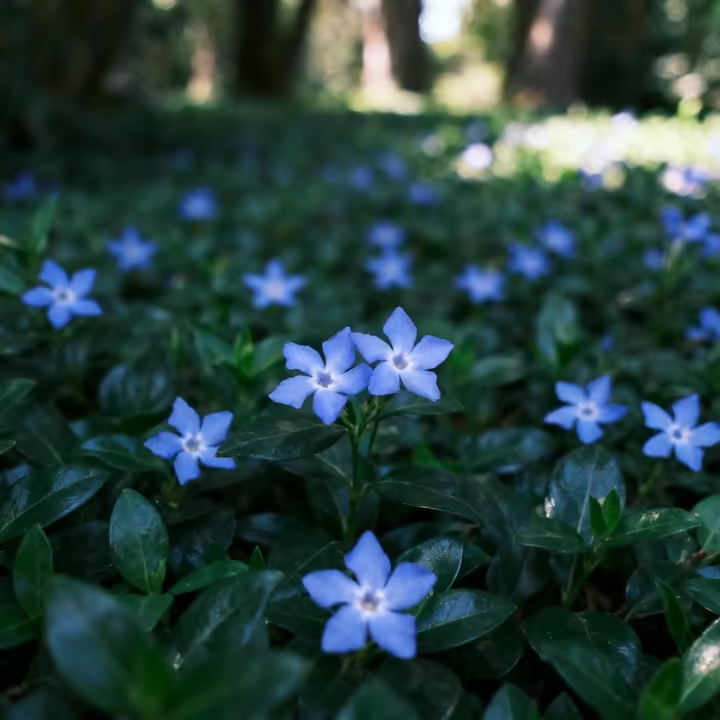
Its nicknames hint at this, from the simple Creeping Myrtle to the mysterious "Sorcerer's Violet". 1 The biggest point of confusion, though, is its name. The common garden periwinkle, Vinca , is often mistaken for its tropical cousin, the Madagascar periwinkle, Catharanthus roseus . 2 They are totally different plants, a point we'll make very clear.
What is Periwinkle?
Periwinkle is in the dogbane family, Apocynaceae, which often means milky sap oozes from broken stems. 2 It’s an evergreen perennial that acts more like a trailing vine than a shrub. 7 It sends out long, creeping stems that form dense, sprawling mats on the ground. 3
This growth habit is where it gets its name, from the Latin word vincire , meaning "to bind". 11 Its ability to bind the soil is the source of its toughness and its folklore.
Periwinkle's best feature is its foliage. The leaves are dark green, glossy, and almost leathery, staying vibrant all year. 1 They grow in opposite pairs along the stem and are usually elliptical or lance-shaped. 1, 12
Solitary flowers emerge from the leaf axils in spring, with a few more sometimes showing up in the fall. 1 The flower has five petals in a simple pinwheel shape, fused at the base into a skinny tube. 1, 9 The color is usually a cool periwinkle blue, but you'll also find it in lavender, deep violet, and pure white. 3
Greater vs. Lesser Periwinkle
Gardeners usually deal with two types: Vinca minor (Lesser Periwinkle or Creeping Myrtle) and Vinca major (Greater Periwinkle). 1 Choosing between them is both an aesthetic and a practical decision, it's a choice between a tidy ground cover and a much bigger, more aggressive plant.
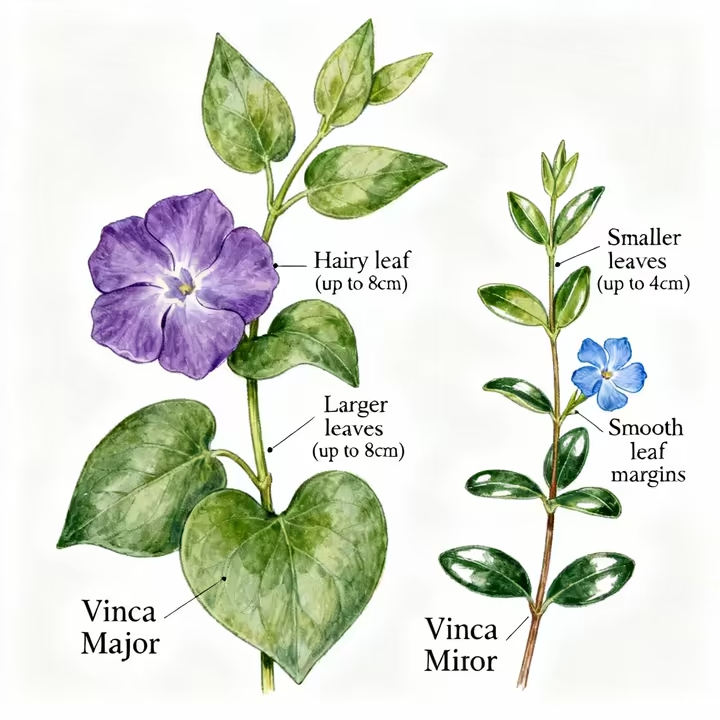
Lesser Periwinkle (Vinca minor)
As the name says, this one's smaller and more delicate. 9 It forms a low, dense mat of elliptical leaves about 4 cm long on very short stalks. 9 The flowers are also petite, averaging 2.5 cm across, often in a pale, lilac-blue. 9
It spreads by rooting all along its stems wherever they touch moist soil. 9 This makes it great at forming a thick, weed-suppressing carpet. Some popular types (cultivars) include the white 'Alba', deep purple 'Atropurpurea', and variegated versions like 'Ralph Shugert' (white edges) or 'Illumination' (gold centers). 21
Greater Periwinkle (Vinca major)
This one is bigger and grows faster. 20 Its leaves are larger, up to 8 cm, and are more heart-shaped at the base. 2 The leaf stalks are much longer (up to 20 mm), giving the plant a more open, arching look. 9
A key difference, if you get up close, is the tiny hairs on the edges of its leaves, which Vinca minor doesn't have. 9 The flowers are bigger too, up to 5 cm across, and usually a deeper blue-purple. 9 It "leapfrogs" across the ground, with its long stems rooting only at their tips, letting it cover ground more quickly. The most common type is 'Variegata', which has green leaves with creamy white edges. 9, 24
History and Spooky Folklore
Periwinkle is from Europe, northern Africa, and western Asia. 6 It was brought to North America in the 1700s as a pretty ground cover for shady spots. 3 But long before that, it had a wild reputation in European folklore.
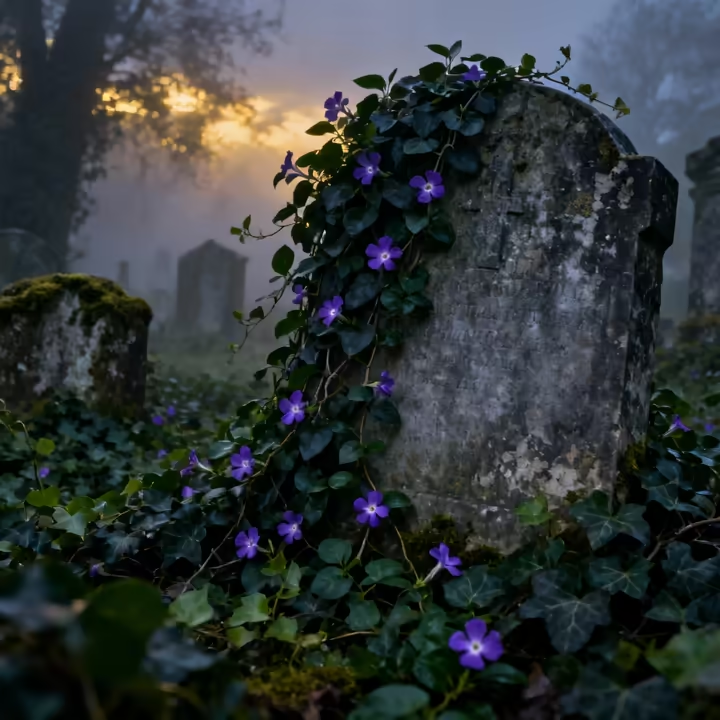
Because it stays green all winter, it became a symbol of immortality, eternity, and everlasting love. 27 People wove it into wedding garlands for a long, happy marriage. 29 Its binding stems were also a metaphor for memory, so it was often planted on graves to show a loved one would not be forgotten. 27
But it had a much darker side. In Italy, it was called the "flower of death" ( fiore di morte ). 3 Its tough vines were woven into crowns for criminals on their way to be executed, or for deceased children. 3 This grim connection probably came from it being poisonous and liking to grow in shady, somber places like deep woods and old cemeteries.
This duality gave it a mystical vibe, earning it the name "Sorcerer's Violet" and a reputation for protecting against evil spirits. 28 You can even spot periwinkle blue in F. Scott Fitzgerald's The Great Gatsby , where Gatsby's shirts symbolize his romantic dreams. 32
A Medical Mix-Up (And a Warning!)
The story of periwinkle in medicine is a big deal, but it’s also a classic case of mistaken identity. The powerful "vinca alkaloids" that changed cancer treatment do not come from common garden periwinkle. 17 They come from its tropical relative, the Madagascar Periwinkle, Catharanthus roseus .
The Cancer-Fighting Cousin
In the 1950s, scientists studied Madagascar Periwinkle, hoping to use it for diabetes based on its use in Jamaican folk medicine. 34 That didn't work... but they found its extracts dramatically lowered white blood cell counts in lab animals. 34 This pointed to a new weapon against blood cancers like leukemia, which involve the overproduction of white blood cells.
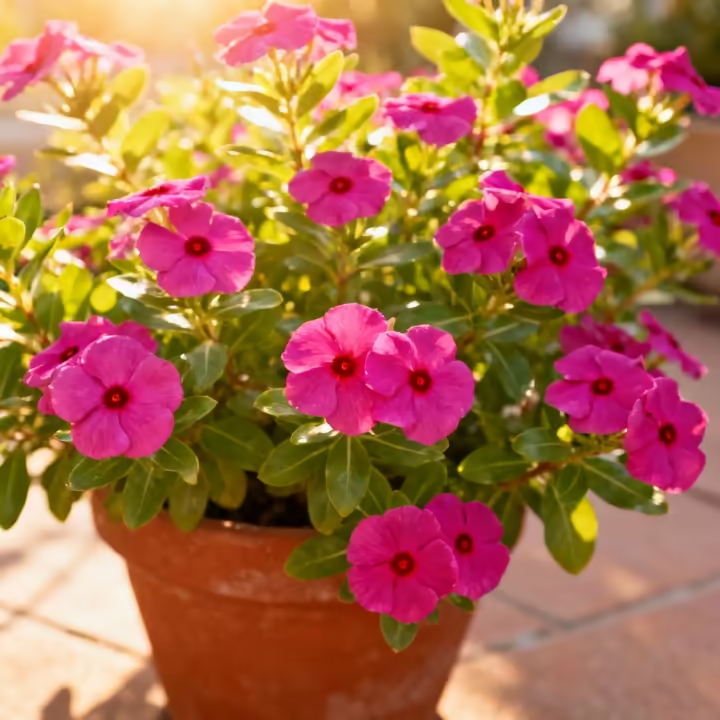
This lucky find led to the isolation of two chemo drugs, vincristine and vinblastine . 35 The introduction of vincristine was a game-changer for childhood leukemia, helping to raise survival rates from less than 20% to over 80%. 37 Today, these compounds are still vital for treating cancers like Hodgkin's lymphoma and breast cancer. 36
Warning: Garden Periwinkle is Poisonous
Let's be very clear, common garden periwinkles, Vinca minor and Vinca major , are poisonous. 38 All parts of these plants contain toxic alkaloids that should never be eaten. While they don't have the specific compounds used in chemo, they can cause serious harm.
Ingesting the plant can lead to severe vomiting and diarrhea, as well as a dangerous drop in blood pressure. 39 In larger amounts, the toxins can cause tremors, seizures, and other neurological symptoms. 40 So, never use Vinca for home remedies, and plant it away from areas where small children or pets might nibble on it. 39
How to Grow It
The things that make periwinkle invasive also make it ridiculously easy to grow in a controlled garden setting. It loves partial to full shade, where its leaves get their richest green color. 2 It can handle full sun, but its leaves might look a bit yellow (though it may produce more flowers). 14
Periwinkle isn't picky about soil but does best in moist, well-drained soil with some organic matter mixed in. 14 Once established, it's very drought-tolerant, but new plantings should be watered regularly. 14, 21 It doesn't need fertilizer, in fact, feeding it can lead to more leaves and fewer flowers. 14
Pruning isn't needed for the plant's health, but it's essential for control. You can shear it back hard in the early spring to keep its spread in check and encourage fresh, dense growth. 1, 14 Pests, deer, and rabbits usually leave it alone, but it can get fungal diseases in wet, humid conditions. 2, 14
The Trouble with Periwinkle
That toughness becomes a major ecological problem when periwinkle escapes into the wild. Both Vinca major and Vinca minor are listed as invasive species in many parts of North America, where they can harm native ecosystems. 12 It spreads with bits of stem that root easily where they touch the ground, forming a dense, impenetrable mat. 1, 6
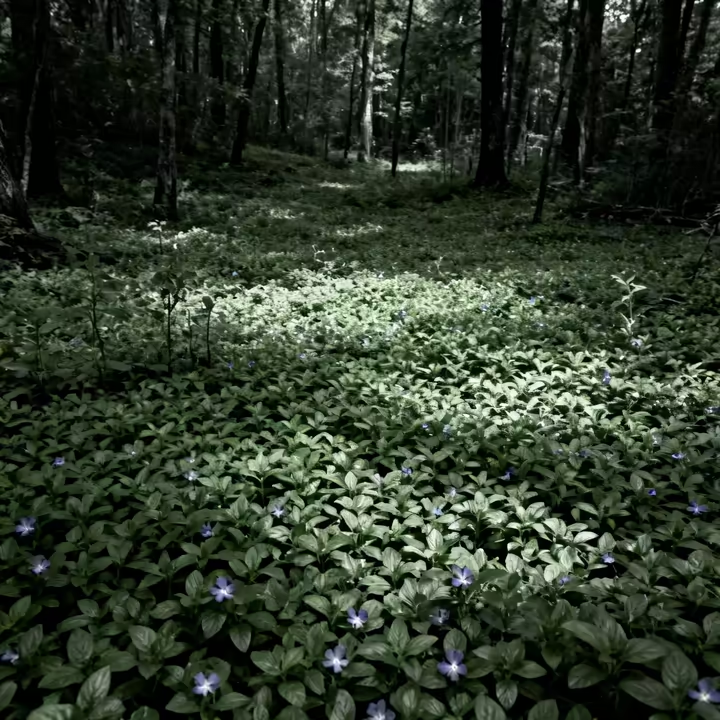
These thick, light-blocking mats smother native wildflowers and other ground plants. 3 They also stop new tree and shrub seedlings from sprouting, which damages the forest and harms wildlife. 1 While both are bad news, the bigger Vinca major is often considered the more aggressive invader. 10
So, be a responsible gardener. Only plant periwinkle in contained areas, like between a foundation and a sidewalk, in raised planters, or in beds bordered by lawn. 10 Never plant it near natural woodlands or ravines. Instead, pick a nice native ground cover like Wild Ginger ( Asarum canadense ) or Woodland Phlox ( Phlox divaricata ). 47
Wait, That's Not Periwinkle?
One of the biggest mix-ups in the garden world is the name "vinca" or "periwinkle." The hardy, vining ground cover we've been talking about ( Vinca ) and the bright, bushy bedding plant you buy every summer ( Catharanthus roseus ) are two totally different plants. 4
They're in the same plant family, Apocynaceae, but that’s about it. The confusion is a historical hangover, Catharanthus roseus used to be called Vinca rosea , and the old name stuck around in nurseries. 17
The main difference is how they grow. Vinca is a hardy, woody, perennial vine that forms a low, spreading mat in the shade (USDA Zones 4-9). 1, 19 In contrast, Catharanthus roseus is an upright, bushy plant that grows in a neat clump about 1-2 feet tall. 13 It’s a tender perennial from Madagascar, so it loves heat and is grown as an annual in most places. 13
Their flowers and leaves are different, too. True Vinca flowers are in a cool spectrum of blue, violet, and white. 9
Catharanthus has been bred for a huge range of warm, vibrant colors like bright pink, hot magenta, red, and salmon, almost always with a darker-colored center "eye". 17 Its leaves are also a lighter green and less glossy than the dark, leathery leaves of true Vinca . Knowing the difference will help you get the right plant for the right spot.
Works cited
- Large & Small Periwinkle (Vinca minor & Vinca major), https://tualatinswcd.org/species/large-small-periwinkle/
- Vinca minor (Bowles Periwinkle, Common Periwinkle, Dwarf ..., https://plants.ces.ncsu.edu/plants/vinca-minor/
- Periwinkle | bcnwp, https://www.bcnwp.org/periwinkle
- Vinca: The Trouble with Common Names - Clemson HGIC, https://hgic.clemson.edu/vinca-the-trouble-with-common-names/
- Periwinkle Uses, Benefits & Dosage - Drugs.com, https://www.drugs.com/npp/periwinkle.html
- Vinca major - IPCW Plant Report – California Invasive Plant Council, https://www.cal-ipc.org/resources/library/publications/ipcw/report88/
- Vinca (Vinca) - FSUS - Flora of the Southeastern United States, https://fsus.ncbg.unc.edu/main.php?pg=show-taxon-detail.php&taxonid=66050
- Vinca minor (Periwinkle) Apocynaceae - Lake Forest College, https://www.lakeforest.edu/academics/majors-and-minors/environmental-studies/vinca-minor-(periwinkle)-apocynaceae
- Comparing Periwinkle Species - Lizzie Harper, https://lizzieharper.co.uk/2020/11/comparing-periwinkle-species/
- Periwinkle - Indiana, https://www.in.gov/dnr/files/Periwinkle.pdf
- periwinkle - Sesquiotica, https://sesquiotic.com/2024/07/15/periwinkle/
- common periwinkle (Vinca minor L.) - Invasive.Org, https://www.invasive.org/species/subject.cfm?sub=3081
- Vinca, Madagascar Periwinkle | Herbaceous Plant Finder ..., https://www.depts.ttu.edu/plantresources/Pages/directories/landscape-info-sheets/herbaceous-info/Catharanthus_roseus.php
- Periwinkle | Home & Garden Information Center - Clemson HGIC, https://hgic.clemson.edu/factsheet/periwinkle/
- What is the difference between Vinca major and common periwinkle? - PictureThis, https://www.picturethisai.com/ask/Vinca_minor-0.html
- Vinca major (Big Leaf Periwinkle, Blue Buttons, Blue Periwinkle, Greater Periwinkle, Periwinkle, Vinca) | North Carolina Extension Gardener Plant Toolbox, https://plants.ces.ncsu.edu/plants/vinca-major/
- Catharanthus roseus ~ Madagascar Periwinkle ~ Vinca Rosea ~ Rosy Periwinkle ~ Plant Care Guide | Auntie Dogma's Garden Spot, https://auntiedogmasgardenspot.wordpress.com/2013/05/24/catharanthus-roseus-madagascar-periwinkle-vinca-rosea-rosy-periwinkle-plant-care-guide/
- Vinca minor | Landscape Plants | Oregon State University, https://landscapeplants.oregonstate.edu/plants/vinca-minor
- A Shopper's Guide to Vinca - Costa Farms, https://costafarms.com/blogs/get-growing/a-shopper-s-guide-to-vinca
- Vinca Major vs Vinca Minor - YouTube, https://www.youtube.com/watch?v=wJ3SYZzHjBc
- Vinca minor 'Bowles's Variety' (Lesser Periwinkle) - Gardenia.net, https://www.gardenia.net/plant/vinca-minor-bowles-variety-periwinkle
- Vinca: Periwinkle | Portland Nursery, https://www.portlandnursery.com/groundcovers/vinca
- Common Periwinkle, Lesser Periwinkle, Vinca minor - VCE Publications - Virginia Tech, https://www.pubs.ext.vt.edu/content/pubs_ext_vt_edu/en/3010/3010-1471/3010-1471.html
- periwinkle (Vinca major) - PlantRight, https://plantright.org/invasive/vinca-major/
- How To Grow And Care For Variegated Vinca Vine - Southern Living, https://www.southernliving.com/garden/plants/variegated-vinca
- common periwinkle: Vinca minor (Gentianales: Apocynaceae): Invasive Plant Atlas of the United States, https://www.invasiveplantatlas.org/subject.cfm?sub=3081
- Discover the Enchanting World of Common Periwinkle: Legends and Symbolism, https://www.picturethisai.com/language-flower/Vinca_minor.html
- Unveiling the Symbolism and Beauty of the Greater Periwinkle Flower, https://www.picturethisai.com/language-flower/Vinca_major.html
- Periwinkle Flower Meaning - Flower Meaning, https://www.flowermeaning.com/periwinkle-flower/
- Meaning Of Periwinkle Flowers: A Symbol Of Love & Remembrance - The Daily Blooms, https://thedailyblooms.com/blogs/news/periwinkle-flowers-meaning
- www.bcnwp.org, https://www.bcnwp.org/periwinkle#:~:text=Periwinkle%2C%20an%20evergreen%20trailing%20groundcover,on%20their%20way%20to%20execution.
- #Powercolors: The Origin and History of the Periwinkle Color | Pixartprinting, https://www.pixartprinting.co.uk/blog/perwinkle-color/
- Grisaille Panels with Stylized Periwinkle Flowers - French - The Metropolitan Museum of Art, https://www.metmuseum.org/art/collection/search/469884
- The many lives of a medicinal superstar: delving into the global story of Catharanthus roseus, https://www.chelseaphysicgarden.co.uk/the-many-lives-of-a-medicinal-superstar-delving-into-the-global-story-of-catharanthus-roseus/
- Catharanthus roseus - Wikipedia, https://en.wikipedia.org/wiki/Catharanthus_roseus
- Vinca Alkaloids - PMC, https://pmc.ncbi.nlm.nih.gov/articles/PMC3883245/
- VINCA ALKALOIDS FROM MADAGASCAR PERIWINKLE (Catharanthus roseus (L.) G.Don): AN OVERVIEW. - ResearchGate, https://www.researchgate.net/publication/367339789_VINCA_ALKALOIDS_FROM_MADAGASCAR_PERIWINKLE_Catharanthus_roseus_L_GDon_AN_OVERVIEW
- Vinca major & V. minor - Invasive Species of North America - Lyrae Nature Blog, https://lyraenatureblog.com/vinca-major-vinca-minor-periwinkles/
- Are Vinca Poisonous? | Plant Addicts, https://plantaddicts.com/are-vinca-poisonous/
- Vinca Poisoning in Dogs - Symptoms, Causes, Diagnosis, Treatment, Recovery, Management, Cost - Wag!, https://wagwalking.com/condition/vinca-poisoning
- Vinca Alkaloid Toxicity - StatPearls - NCBI Bookshelf, https://www.ncbi.nlm.nih.gov/books/NBK557842/
- Vinca | UMN Extension, https://extension.umn.edu/flowers/vinca
- Planting Vinca | Plant Addicts, https://plantaddicts.com/planting-vinca/
- extension.umn.edu, https://extension.umn.edu/flowers/vinca#:~:text=Vincas%20are%20heat%2Dloving%20plants,of%20pests%2C%20diseases%20and%20fertilizing.
- Invasive to Avoid: Big Periwinkle - California Department of Fish and Wildlife, https://wildlife.ca.gov/Conservation/Plants/Dont-Plant-Me/Big-Periwinkle
- Vinca minor - Friend or Foe? - Indiana Yard and Garden - Purdue University, https://www.purdue.edu/hla/sites/yardandgarden/vinca-minor-friend-or-foe/
- Fact Sheet Perwinkle.indd - Conservation Halton, https://www.conservationhalton.ca/wp-content/uploads/2022/05/factsheetperwinkle.pdf
- Vinca major Profile – California Invasive Plant Council, https://www.cal-ipc.org/plants/profile/vinca-major-profile/
- Replace Periwinkle (Vinca) With These Groundcovers | Johnson's Nursery | KB, https://kb.jniplants.com/replace-periwinkle-vinca-with-these-groundcovers
- Native Plant Alternatives to Vinca minor (Lesser Periwinkle), https://www.gardenia.net/guide/native-plant-alternatives-to-vinca-minor
- Does anyone know why Vinca rosea is now named Catharanthus Rosea, and what phytochemicals C. Rosea shares with vinca minor/major? : r/botany - Reddit, https://www.reddit.com/r/botany/comments/fwzvxw/does_anyone_know_why_vinca_rosea_is_now_named/
- Annual Vinca | Home & Garden Information Center - Clemson HGIC, https://hgic.clemson.edu/factsheet/annual-vinca/